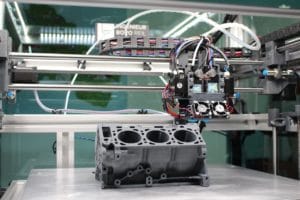
Those unfamiliar with the term additive manufacturing may know it by the more popular phrase, 3D printing. Additive manufacturing encompasses all technologies that build 3D objects by adding material layer upon layer. These technologies include 3D printing, direct digital manufacturing, layered manufacturing, additive fabrication, and rapid prototyping. Additive manufacturing, when used as a compliment to traditional manufacturing, allows for a design-driven manufacturing process wherein design determines production rather than the other way around. Other benefits of additive manufacturing include:
As versatile as additive manufacturing is, it does have some drawbacks. Specifically poor surface quality – most commonly due to the “staircase effect” – and an inability to produce tight tolerances. Postprocessing is the critical last step of the additive manufacturing process in which surface characteristics are improved and parts are brought into alignment with design specifications. Precision machining is often used to produce exact holes and cuts or smooth, flat surfaces for interfacing with other parts. Postprocessing machining also corrects surface imperfections to enhance a part’s aesthetics.
At Reading Plastic, our immaculately maintained machines and ultra-precise cutting tools allow us to offer superior CNC services. We can bring additive manufactured parts into compliance with tight tolerances through:
If your additive manufacturing parts require smooth finishes and close tolerances, call Reading Plastic at 610-926-3245 or fill out a quote request form. We are committed to superior quality and excellent customer service, with all our parts passing a rigorous ISO 9001:2008 certified quality inspection before they are shipped.